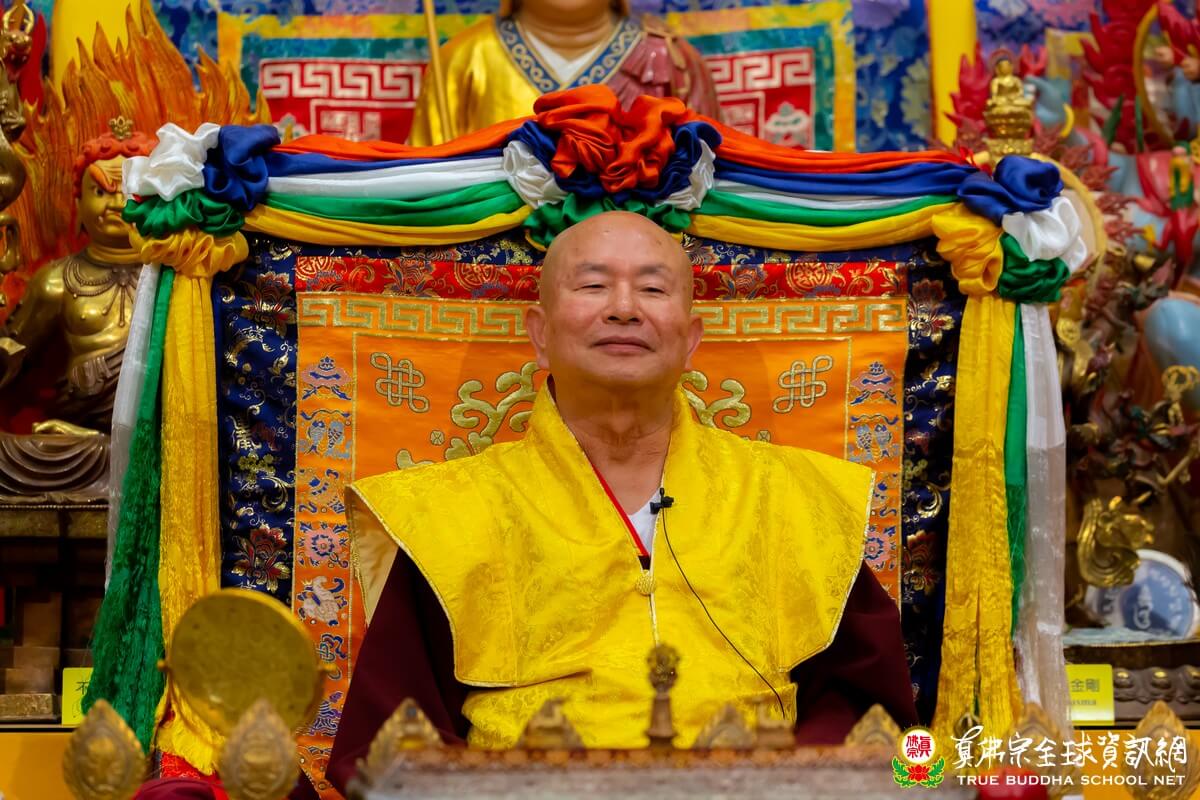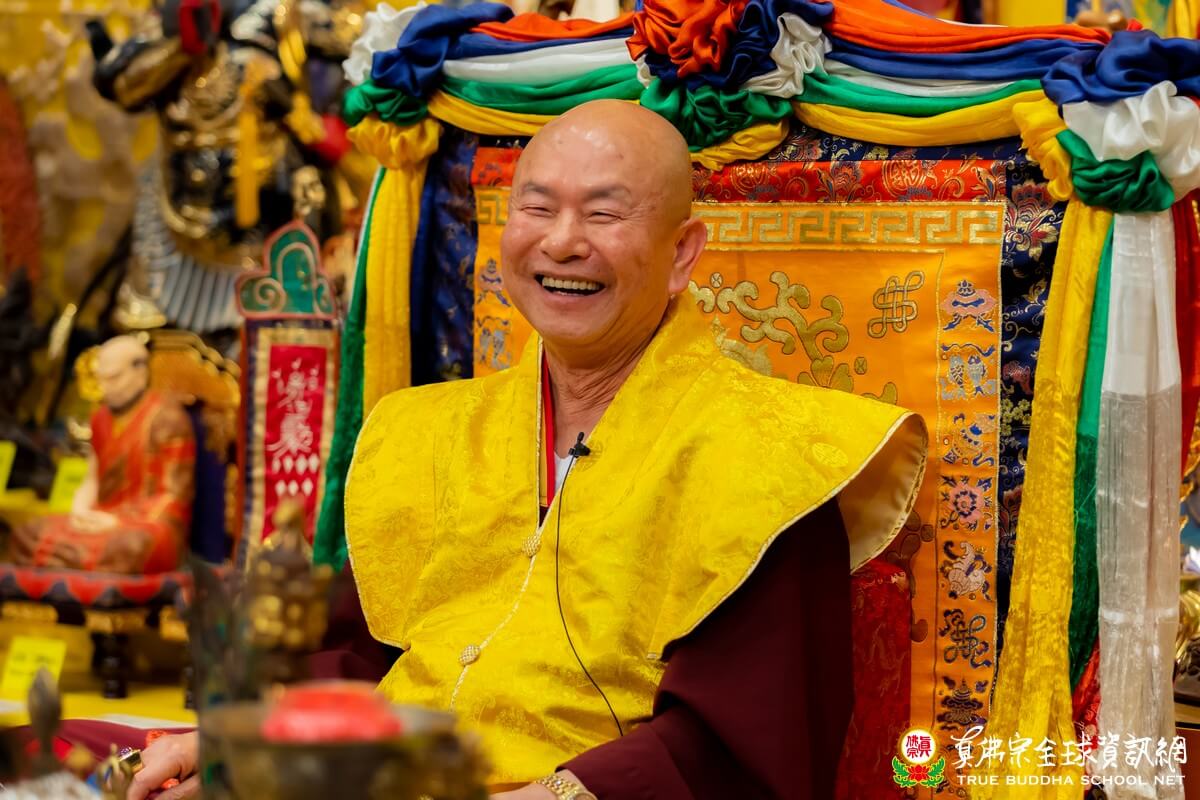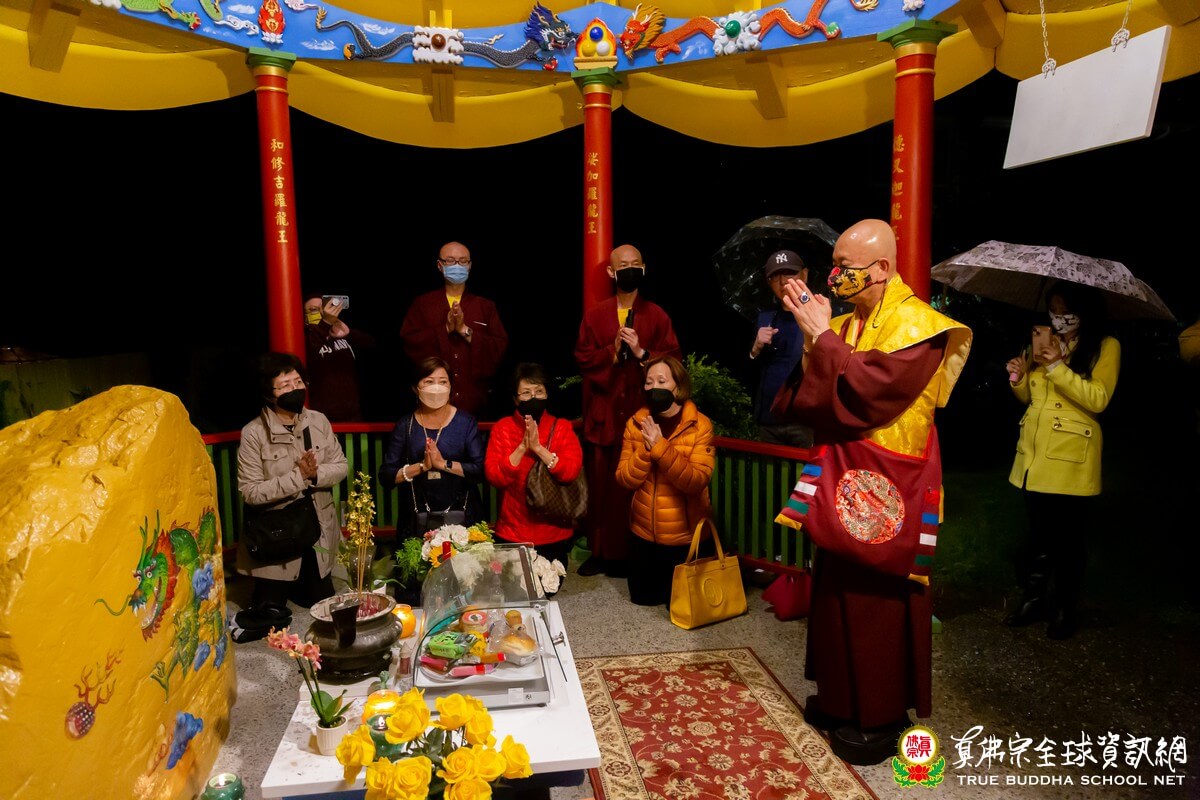
A Detailed Exposition of the Vimalakirti Sutra
by Grandmaster Lu, Living Buddha Lian Sheng of the True Buddha School
Translated into English by the True Buddha School Vimalakirti Translation Team
Discourse 5, 4 June 2022 - Chapter One—Buddhaverse (Continued)
Chapter One—Buddhaverse
Thus have I heard: At one time, the Buddha was in the Amra Garden near the city of Vaisali, accompanied by eight thousand great bhikkus, thirty-two thousand bodhisattvas, and the assembly of virtuous and knowledgeable spiritual practitioners.
Their attainments in great wisdom and fundamental conduct were solely due to the divine might of the buddhas. Together, they formed a dharma-protecting fortress to uphold the correct dharma. Their lion’s roar resounded throughout all ten directions. People were naturally enticed to join, and the atmosphere was affable.
Now, we will continue to talk about the Vimalakirti Sutra’s Chapter One—Buddhaverse.
…Accomplished in great wisdom and fundamental conduct…
Great wisdom is a topic that can be explained at length, so this is the only topic I will discuss tonight. Great wisdom refers to prajna, which is chanted as bedza in mantras such as Om Ah Hum Bedza Guru Behma Siddhi Hum Seh. Why is bedza included in the mantras? Because all buddhas, bodhisattvas, arhats have perfect wisdom. The great bhikkus mentioned this in the sutra text, and the great bodhisattvas all have perfect wisdom.
There are three kinds of wisdom: the wisdom of emptiness,[1] the wisdom of existence,[2] and the wisdom of the tathagata. [3] They also have other names reflecting varying views of how Buddhists relate to these wisdoms, such as the wisdom of all-knowledge, the wisdom of the knowledge of the path, and the all-embracing wisdom.
First, let me speak on the wisdom of all-knowledge. What is it? It is the wisdom of emptiness! It is the wisdom that everything is inherently empty. All Buddhists [should] know the wisdom that everything is inherently empty. What does it mean that everything is inherently empty? That nothing exists?
I often use this analogy about the Moon. What exists on the Moon? Human beings, animals, sentient beings do not exist there. So there are no phenomena of self, of human beings, of sentient beings, and of lifespan. Since there is nothing on the Moon, time is irrelevant there—it has no function. Time only has meaning for humans. When there are no human beings, time becomes useless.
Is lunar land relevant to us? No. Does anybody know how much a piece of land is worth on the Moon? We know its price in America, say for an acre or two, and people buy and sell them. But what if Grandmaster were to sell the Moon’s land? Would you buy any? For a certain price per acre? See, no one wants to buy it. I can write something up for you. Or you can imagine that all the land on the Moon is yours—you will be a landlord mogul! But is there any use? None. Nobody will buy your land, so what use is it to be a landlord there? It is as if they are non-existent. Empty!
This is the wisdom of emptiness. You can also apply the same notion of emptiness to human beings.
Money is, of course, very useful, but after you die, is money of any use to you? No. Currently, you may have a huge house but after you die, is such a house of any use to you? No. Grandmaster drives a Rolls-Royce and a Maserati. These cars are useful to me now, but one day when I die, will these two cars be of any use to me then? No. After I die, money, houses, and cars are all useless. How about your spouse, children, and grandchildren? Are they of any use to you? No! They all become irrelevant to you.
As a “Grandmaster,” will there be any use after Grandmaster Lu dies? [chuckles] Ok, fine, I will not talk about Grandmaster Lu. Instead, let’s talk about presidents who occupy the highest position. Is the position of any use? No. How many presidents has the United States had? The famous ones are Washington, Jefferson, Lincoln, ... They are all very famous. And Franklin who is memorialized on the dollar bills is also very famous. Are they of any use now? Are they of any use to themselves? No, of course not.
If you contemplate this, you will start to have this wisdom of emptiness. I often give this illustration: a person is in heaven, his money is in the bank, his wife is in another person’s embrace, and his siblings are fighting over his inheritance. The only useful thing is that you are in heaven, and you should be happy about it, but the rest are all useless, as is everything else in the material world—they are all empty!
Everything in the material world has no [true] use. All forms disintegrate, and they are intrinsically empty. A person will become nothing once the four elements of earth, water, fire, and wind disintegrate. What’s left is intangible.
If you have the mindset that everything is [or will become] empty, you can eliminate your afflictions, since you realize that there is nothing to worry about. It is useless to be afflicted. This is the wisdom of emptiness.
Once you gain this wisdom and are always mindful of it, you will not be attached to anything. You go with the flow and are always content, just like what I often say, “Everything is in the best arrangement!” You are fine whether you have it or not, whether it is a lot or a little. Everything is fine; everything is perfect. This is the wisdom of emptiness, the wisdom to know that everything is intrinsically empty, otherwise known as the wisdom of all-knowledge.
If you understand this, you’d regard everything as empty. Understanding that everything tangible, such as wealth, looks, fame, food, and sleep, as well as the eyes, ears, nose, tongue, body, and mind, are all empty will cause you to no longer have afflictions or attachments. This is the method to destroy many kinds of afflictions and attachments.
It is basically a visualization of emptiness. You can visualize that everything is intrinsically empty, including your body because even the strongest body can become the weakest, and the richest person can become the poorest. It doesn’t matter how strong or rich you are; in the end, it will all be gone. This is the wisdom of knowing that everything is intrinsically empty.
This concept would never occur to most ordinary people. All they care about is earning money. [But for practitioners, we should think,] if we win a lottery, that’s good. If we don’t, that’s also good. That’s why I often say that everything is in the best arrangement. We just ask for no suffering and no pain. But strictly speaking, even suffering itself is non-existent—it ends when we die.
For example, you go to the dentist to take care of your teeth, perhaps for cavities, gum disease, orthodontics, or dentures. We have many dentists here, such as Kwei Ching and Doctor Zhuang, and many others who are studying to become dentists. Like Jessica, who is going to Philadelphia to study dentistry. Do you know that cavities can only exist in teeth while you are alive? All your problems will disappear when the body disappears. Everything will disappear.
Everyone will end up the same; therefore, you don’t need to be afflicted. Whether you have something or not, it’s all the same. Spiritual cultivators like to remind themselves of this by displaying the character “death” on their bed’s headboard. Being mindful of death, they have no more afflictions for upon death, everything is gone. This is the first kind of wisdom: the wisdom to know that everything is intrinsically empty, also called the wisdom of emptiness.
The second kind of wisdom is the wisdom of existence. While the first kind of wisdom—the wisdom of all-knowledge—is about emptiness, the second kind of wisdom—the wisdom of the knowledge of the path—is about non-emptiness.
Bodhisattvas have the wisdom of emptiness; they sometimes use this wisdom to cut off their afflictions and attachments. Additionally, they also have the wisdom of existence, which talks about non-emptiness or existence: that all dharma (everything tangible) exists and is established on top of emptiness.
“Dharma” here refers to one’s surroundings and all phenomena in the material world; dharma does not refer to only buddhadharma. We are talking about everything that exists in the world of substance. Spiritual cultivation must be done based on this “dharma,” meaning, based on tangible things. Otherwise, how can you cultivate spiritually if you only focus on “emptiness,” thinking everything is empty? You should not think this way.
You need to utilize the existence in the material world [such as your body] to practice. And everything that exists comes into existence from emptiness. This understanding is called the wisdom of existence, and bodhisattvas have this wisdom. They know what is allowed and what is not allowed. Hence, the precepts are the wisdom of existence. Meditation, too, is also achieved through this wisdom.
We utilize existence to enter the wisdom of emptiness; so we start from the wisdom of existence to reach the wisdom of emptiness. And you cannot be biased toward any side, neither toward the wisdom of emptiness nor the wisdom of existence.
For example, living in this world, one has worldly wisdom like learning and improving oneself in the four major occupations—academia, agriculture, craftsmanship, and trade. To earn a high position, you’d also need to study technology, et cetera. You know that some wisdom is needed to succeed in business, politics, or the military. Similarly, wisdom is also needed in our Buddhist study and practice. All sorts of worldly wisdom are referred to as the wisdom of existence.
There are many precepts in Buddhism. Likewise, there are rules and regulations in this world, whether they are for countries, temples, or families. Bodhisattvas have the wisdom to know which precepts are required for a particular attainment. Once you generate the bodhisattva’s vow, you must keep your vow and abide by the bodhisattva’s precepts just like the bodhisattvas. This is the wisdom of existence.
By observing the precepts and doing good, you can go to heaven. In Buddhism, heaven refers to the heavenly realms of form, formlessness, and desire. To escape the rebirth cycle of the six realms of samsara, you need the particular wisdom to allow this liberation. These wisdoms are referred to as the wisdom of existence, otherwise known as the wisdom of knowledge of the path.
To reiterate, above emptiness, there’s also non-emptiness. How do you utilize and harmonize emptiness and non-emptiness? That’s the wisdom of the tathagata. You cannot be partial to emptiness and think everything is empty. You also can’t be partial to existence because you would become too mundane. If you solely think about emptiness, then you won’t do any dharma practices because you believe that they are all empty and false, as all phenomena and existences in the material world are false.
You combine both emptiness and non-emptiness—referred to as “dual execution” of emptiness and non-emptiness. The ability to harmonize and perfectly balance the two is the wisdom of the buddhas—the all-embracing wisdom.
The Tiantai Sect states the Threefold Contemplation of Tiantai: Contemplation of Emptiness, Contemplation of Falsehood, and Contemplation of the Middle Way.
The Tiantai Sect’s Contemplation of Emptiness is the wisdom of emptiness—everything is empty. The Contemplation of Falsehood is the wisdom of existence—even when phenomena exist, all phenomena of existences are false.
Like human beings, are they false? Of course they are, because human beings come into existence only due to the appropriate causes and conditions. They are made up of an aggregate of earth, water, fire, and wind. When the four elements disintegrate, they also are gone. Thus, they are false [no intrinsic reality].
Houses, cars, and humans are all aggregates. Money is false too, because money is only money when its country approves it to be money. The True Buddha School spirit money is only useful because the True Buddha School approves it. Otherwise, it is only paper. Like with bank notes, the highest denomination that we commonly have is the $100 bill—we call it the Franklin note. I heard that between banks and governments, they also use $1,000 and even $10,000 bills. Have you ever heard of these? They are valid because the government approves it. Otherwise, they’re just paper, useless as it is too rough to be used as toilet paper. So, money is false.
It is the same with precious metals and precious stones; they are merely minerals. Diamonds are only valuable because people place value on them. Otherwise, they’re just lustrous stones. Everything that we wear is made of either plants or minerals. So, all existences are false! That’s why the Tiantai Sect states that all existences are false.
Last is the Contemplation of the Middle Way, which is the wisdom of the tathagata. The middle way is when both “emptiness” and “falsehood” are balanced and harmonized perfectly. Both extremes of nihilism and existentialism are to be avoided. If you are too attached to emptiness, you are in danger of nihilism. So you balance it with existence/falsehood.
Buddhism teaches the Middle Way (Madyamaka) and the Consciousness-Only (Yogacara). In the Yogacara tradition, ultimately, only the immaculate consciousness is left. In the Madyamaka tradition, the ultimate attainment is perfect balance and harmony.
In sum, there are three kinds of great wisdom: the wisdom of emptiness, the wisdom of existence, and the wisdom of the tathagata. They are the wisdom to know that everything is emptiness, the wisdom to recognize all existences as false, and the all-embracing wisdom of the middle way—the highest wisdom of the tathagata.
All the buddhas and bodhisattvas comprehend these three wisdoms. That’s why it’s called the great wisdom. They are also the threefold contemplation of the Tiantai Sect. Do you understand now?
Having the wisdom of emptiness, you can apply the visualization of emptiness whenever you encounter problems. Then you’ll have no more afflictions and attachments to self. Having the wisdom of existence, you utilize them in your spiritual cultivation to further reach the wisdom of the tathagata.
As written in the Vajra Sutra, all dharma is false. Dharma itself needs to be forsaken, let alone the non-dharma. In the end, you need to abandon the buddhadharma to allow for attainment. Upon fruition, the dharma used to attain the fruition is no longer needed. When you have attained buddhahood, will you still need to continue practicing [to attain buddhahood]? You will be on the path of no learning (no practice). Because for a buddha, no practice is the same as practice, and practice is the same as no-practice. Once the highest realm is reached, there is no more need for any dharma.
The middle way is when you perfectly incorporate, reconcile, balance, and harmonize both emptiness and existence. You do so until ultimately, you become completely pure—which is the immaculate consciousness mentioned in Yogacara.
The ultimate in Buddhism is all about Madyamaka and Yogacara: inclusion of both emptiness and existence; and the immaculate/untainted consciousness, or the utterly pure consciousness. This is my explanation on great wisdom. It’s very difficult to explain, but you get the idea.
Om mani padme hum.


Next discourse on the Vimalakirti Sutra: Discourse 6, 5 June 2022 - Chapter One—Buddhaverse (Continued)
Previous discourse on the Vimalakirti Sutra: Discourse 4, 29 May 2022 - Chapter One—Buddhaverse (Continued)
Index of links to all discourse on the Vimalakirti Sutra: https://en.tbsn.org/guidem/detail/2975/
Back to the main index page of all dharma discourse: https://en.tbsn.org/guidem/index
Full webcast of 2022.06.04 Yellow Jambhala Group Practice (Ling Shen Ching Tze Temple, Redmond, USA) and dharma discourse with English interpretation: https://youtu.be/-W7mgEEC-dU




